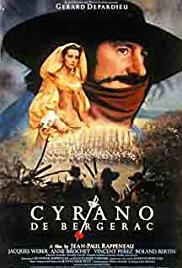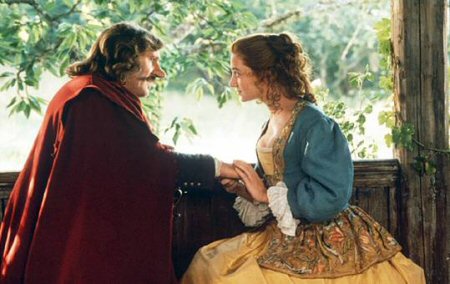CYRANO DE BERGERAC
SUBJECTS — Drama/France; World/France;
SOCIAL-EMOTIONAL LEARNING — Romantic Relationships; Self-esteem;
MORAL-ETHICAL EMPHASIS — Respect.
AGE; 10+; MPAA Rating — PG; Drama; 1990; 138 minutes; Color;
Available from Amazon.com.
There is NO AI content on this website. All content on TeachWithMovies.org has been written by human beings.

SUBJECTS — Drama/France; World/France;
SOCIAL-EMOTIONAL LEARNING — Romantic Relationships; Self-esteem;
MORAL-ETHICAL EMPHASIS — Respect.
AGE; 10+; MPAA Rating — PG; Drama; 1990; 138 minutes; Color;
Available from Amazon.com.
One of the Best! This movie is on TWM’s list of the best movies to supplement classes in Drama, High School Level.
For French or English Language Arts classes, distribute TWM’s Film Study Worksheet. Teachers can modify the worksheet to fit the needs of each class. Ask students to fill out the worksheet as they watch the film or at the film’s end.
This is an outstanding film version of the classic play. Cyrano de Bergerac is one of the most fascinating and contradictory literary characters of all time. He is both bombastic and timid; ugly and beautiful; brave and cowardly; poet and swordsman.
Awards:
1990 Academy Awards: Best Costume Design; 1991 British Society of Cinematographers: Best Cinematography; 1990 Cannes Film Festival: Best Actor (Depardieu); Technical Grand Prize; 1991 Golden Globe Awards: Best Foreign Film; 1991 European Film Awards: Best Production Design; 1990 Cesar Awards: Best French Film; Best Actor (Depardieu); Best Director; Best Cinematography; Best Costume Design; Best Editor; Best Music Written for a Film; Best Production Design; Best Sound; Best Supporting Actor (Weber); 1990 Academy Awards Nominations: Best Foreign Language Film; Best Actor (Depardieu), Best Art Direction-Set Decoration; Best Makeup.
Featured Actors:
Gerard Depardieu, Anne Brochet, Vincent Perez, Jacques Weber, Roland Bertin, Philippe Morier-Genoud.
Director:
Jean-Paul Rappeneau.

The movie permits children to work through a number of issues, including: whether the ugly and disfigured can still be loved by someone who is beautiful; the humiliation and lack of self-esteem felt by people who are disfigured or who don’t conform to society’s current conception of beauty or style; how the most vociferous braggart is often trying to cover up a deep psychological wound; the consequences of failing to pursue your dreams or of assuming that someone or something is unattainable; and the differences between how people view and evaluate themselves and how they are viewed and evaluated by others.
“Cyrano de Bergerac” repeatedly and effectively employs irony. The Discussion Questions set out below will help teachers and parents to explore this issue.
None.
Should your child be reading Cyrano de Bergerac in either a French or English class, you may want to show this film. It is an excellent adaptation that vividly communicates the tragic aspects of the story through superb acting. Afterward, you may suggest that your child watch the delightful Steve Martin comedy, Roxanne, which echoes the storyline and theme but ends on a happy Hollywood note. Thus, your child will see that, although written long ago, the ideas in the play still have relevance.
Discussion Questions #8 contains helpful information about the psychology of bullies. The Quick Discussion Question captures an important theme of the play, a theme which will resonate with any adolescent.
The Cyrano of this play was based on a real person, Savinien Cyrano de Bergerac (1619 – 1655), a French duelist and satirist. De Bergerac is quoted as having said:
“A large nose is the mark of a witty, courteous, affable, generous, and liberal man.”
Cyrano de Bergerac was born in 1619 in Perigord, a province in southwest France. He was the subject of ridicule by children his own age due to his very large nose. De Bergerac joined the French army and fought against the Spanish at Arras. He left the military in 1642 to study science and literature in Paris. He also wrote plays and novels of science fiction. De Bergerac was hit by a “falling log” which, as in the play, was rumored to have been set in motion by his enemies. He died a year later.
There are three different types of irony. Each relates to a difference between what is perceived or expected and what occurs. The different types of irony are described below:
(1) Situational irony occurs when there is a difference between what happens and what we expect to happen or what we think should happen. An example of situational irony in fiction is contained in the story of the frog who, when kissed by the princess, becomes a handsome prince. We do not expect that kissing an ugly slimy thing that lives in a swamp and eats flies will bring forth a beautiful young man. In fiction, irony usually points to a theme or moral in the story. Situational irony is often used in comedy and satire because, when skillfully used, it quickly exposes the truth.
Situational irony can also exist in the real world. For example, the United States is a nation founded on the proposition that “. . . [A]ll men are created equal, that they are endowed by their Creator with certain unalienable Rights, that among these are Life, Liberty and the pursuit of Happiness . . . .” However, while the Founding Fathers of the U.S. were brilliant and wise men who were right on many things, they dropped the ball on slavery. In fact, the very existence of the United States depended on a bargain struck at the Continental Congress in 1776 between the representatives of the Northern colonies and the men from the Southern colonies. They agreed that slavery, which resulted in millions of people being denied the right to “life, liberty and the pursuit of happiness”, would be allowed to flourish in the South. At the time of the American Revolution, Southern colonists correctly foresaw that Great Britain would soon ban slavery in all of its colonies. Many Southern colonists were willing to risk a revolution against what was then the most powerful empire on Earth, only if they were assured that they could retain slavery in the new country. This situation is ironic because one would not expect a nation founded on the principles of the Declaration of Independence to owe its existence to a bargain that ensured the slavery of millions for the foreseeable future. [There are multiple examples of situational irony in the history of every country. Teachers in countries other than the U.S. should substitute an example of situational irony in their own history.]
(2) In a work of fiction, dramatic irony occurs when an author creates a contrast between the reality perceived by one or more of the characters and what is known by the audience or the reader. This happens when the audience/reader has greater knowledge about present or future circumstances than the characters in the story. The classic example of dramatic irony is contained in Oedipus Rex. Oedipus kills a man who is a stranger to him and then meets and marries the dead man’s widow. The audience knows that the dead man is Oedipus’ father and that his new wife is his mother. Only later does Oedipus learn these facts, with tragic results. As with situational irony, dramatic irony usually points to a theme or moral lesson.
(3) An ironic statement is one in which there is a significant difference between what is said and what is meant. It occurs when the speaker doesn’t intend to convey the literal meaning of the words used, but instead means something quite different. Often the meaning is the opposite of the literal meaning of the words. Ironic statements can be either “facetious” or “sarcastic”. A facetious comment is one in which the point is to make a joke or a humorous reference. Sarcasm is used to taunt, insult, or cause pain. Facetious statements and sarcasm are often very similar. The identity of the speaker, the tone used, and the context can determine whether a statement is facetious or sarcastic. A person who likes a lot of sugar with their coffee might say, facetiously, “I like a little coffee with my sugar” as he pours an astounding amount of sugar into a cup of coffee. However, a person who wanted to taunt the coffee drinker would say, “You like a little coffee with your sugar, don’t you.”
Irony is central to the appeal of “Cyrano de Bergerac.” It starts at the core of the play and radiates outward in all directions. The underlying irony is that while Cyrano is ugly on the outside, on the inside he has many attributes that we admire: courage (in most areas), kindness, a championing the underdog, loyalty, and love of justice and beauty.
Other examples of irony in this play are as follows:
1. Standard Questions Suitable for Any Film.
No Suggested Answers.
2. Define the literary device of irony and describe three ironic situations in this play.
Suggested Response:
See Section on Irony in the Helpful Background section.
3. At the end of the play, just before Cyrano died, he said of himself, “… [H]e will be remembered for … what? His heart? Courage? No, of course not. Nothing half so commonplace: For his panache.” What did Cyrano mean by “panache?” Why is Cyrano’s devotion to “panache” an instance of irony on at least two levels?
Suggested Response:
We can think of several. First, Cyrano’s nose was kind of his panache, it stuck out from his head as a panache would stick out from a helmet. Second, a person with panache is not generally thought of as being afraid to declare his love to a woman. Third, a panache is made of feathers, a thing of light and airy beauty; Cyrano was far from that.
4. In this film, Cyrano, who is put forward as a man who can do almost anything, is a man without requited love. Is this another example of irony? Why?
Suggested Response:
Yes. Cyrano can do anything but the thing he needs to do the most, pursue his love interest with Roxane.
5. What is ironic about the differences between Cyrano and Christian?
Suggested Response:
Cyrano is ugly to look at but beautiful to listen to. Christian is just the opposite.
6. Henrik Ibsen, the great Norwegian playwright, is reported to have said: “If you put a pistol on stage in Act I, you must use it by the end of Act V?” That is true of this play. What is the “pistol” in “Cyrano de Bergerac?”
Suggested Response:
The fact that Cyrano was hated and resented by many others. At the end of the play, they have killed him. Another way of putting this is that Cyrano was unable to restrain his sarcasm and kept insulting and assaulting people. This is the gun. Inevitably, those insulted would strike back.
7. What qualities of Cyrano do you admire and what qualities would you leave behind?
Suggested Response:
There is no one correct answer to this question. He was courageous (in most areas), kind, a champion of the underdog, loyal, and a lover of justice and beauty. One can admire his skill as a poet, swordsman and soldier. One might not admire his snobbishness and insensitivity; his tendency to resort to violence, his obsession with his nose, and his cowardice in the face of Roxane.
8. Many people believe that bullies are, like Cyrano, covering up some insecurity or sense of vulnerability. This is incorrect. Psychological studies find that most bullies “see themselves quite positively” and are unaware of what others actually think of them. What makes most bullies starts in early childhood. They have ingrained patterns of using aggression and hostility in their relationships with other people. A feeling of insecurity is only one of many things that can trigger a hostile or violent response from a bully. In fact, no trigger is necessary for a bully to be hostile or aggressive. To solve conflicts and get along in life, bullies rely on aggression and the fear and power that their aggression creates. They have difficulty relating to people on other levels. Marano, H.E., Big Bad Bully Psychology Today. Why do many people think that bullies are covering up for feelings of insecurity and vulnerability?
Suggested Response:
The idea that bullying behavior arises from feelings of insecurity comes from the efforts of normal people to understand what makes a bully. When most people think about this question they use the context of their own, more normal personalities. For them, covering feelings of insecurity by lashing out at others is a natural, if dysfunctional, response. However, bullies don’t see the world that way. For them, aggression, violence and hostility in human relations are the norm. See also TWM’s Snippet Lesson Plan to the Psychology of Bullies Using “17 Again”.
1. Cyrano gave the impression of being a proud man with a lot of self-esteem. But did he really have self-esteem?
Suggested Response:
No. He couldn’t get over his nose.
2. Cyrano insisted that everyone else appear to ignore the size of his nose and yet, in his heart, he believed that everyone thought it to be his most remarkable characteristic. (Certainly, he himself never forgot about it except perhaps when he was caught up in reciting poetry or out-fencing those he wanted to humiliate.) What does this fact tell us about Cyrano’s character?
Suggested Response:
There are many ways to express an answer. Good answers will refer, in one way or another, to his low self-esteem.
3. What if Cyrano had been a woman? Could a tragic figure be created out of a woman with a deformity on her face? What does this tell us about our society and our own reactions to men and women?
Suggested Response:
We don’t know the answer to this question but it will provide some excellent class discussions. Note that there are differences between the answer for Cyrano’s time and for the 1950s in the U.S. and for the present day in the U.S.
4. The opinion leaders in our society value physical fitness and a figure for a woman that is without extra weight but has large breasts and small hips. In other centuries plump women were considered the ideal beauties. In other cultures in our own time, for example in Brazil, women with small breasts and large hips are considered more attractive than women with large breasts and small hips. What does this tell you about beauty?
Suggested Response:
That the ideal body type or shape of face is, in many ways, like a fad. It changes for no reason. This play tells us that beauty is skin deep. Cyrano was, in many ways, a more interesting and beautiful person than Christian.
5. All that Cyrano had to do in order to find the love he desired so much was to declare himself to Roxane and woo her with his words. Compared to many of Cyrano’s other accomplishments, could this have been easily done? What does this tell you about how to live your own life?
Suggested Response:
Cyrano needed to take a risk. His fear immobilized him. Someone once said that our fears are all lies. While this may go a little too far, it is true for many, if not most of our fears.
6. Cyrano was a courageous soldier and fighter, a man of action who took incredible risks. Yet he was afraid to take action in the one area that would have made him happy? Why was this?
Suggested Response:
One can be courageous in some areas and paralyzed by fear in others.
7. Why couldn’t Roxane have signaled to Cyrano that she was in love with him?
Suggested Response:
The answer is that she should have.
Discussion Questions Relating to Ethical Issues will facilitate the use of this film to teach ethical principles and critical viewing. Additional questions are set out below.
(Treat others with respect; follow the Golden Rule; Be tolerant of differences; Use good manners, not bad language; Be considerate of the feelings of others; Don’t threaten, hit or hurt anyone; Deal peacefully with anger, insults, and disagreements)
1. Did Cyrano obey this Pillar in any way?
Suggested Response:
Not really. He was not tolerant nor was he considerate of the feelings of others. Nor did he deal peacefully with anger, insults or disagreements. He certainly threatened, hit and hurt.
2. What action did Cyrano demand of others that he was incapable of? Why?
Suggested Response:
He demanded that people respect him as a person when he was incapable of respecting himself and showed little respect for others. He simply couldn’t get over the size of his nose.
Acknowledgments: Thanks to Rebecca Curtis, an English Professor at Santa Monica College,
for reviewing this Learning Guide. This Learning Guide was last updated on August 4, 2010.

For French or English Language Arts classes, distribute TWM’s Film Study Worksheet. Teachers can modify the worksheet to fit the needs of each class. Ask students to fill out the worksheet as they watch the film or at the film’s end.
* we respect your privacy. no spam here!